Ben-Gvir, a defender of Jewish extremists, poised to become powerful mainstream force
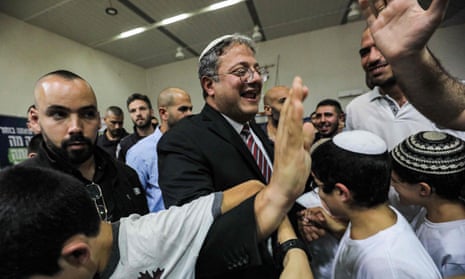
Itamar Ben-Gvir greets supporters during a rally in Sderot this week.
Photograph: Gil Cohen-Magen/AFP/Getty Images
Bethan McKernan in Sderot
Bethan McKernan in Sderot
THE GUARDIAN
Sat 29 Oct 2022
Whenever the far-right politician Meir Kahane got up to speak in the Knesset after winning his Kach party’s only ever seat, in 1984, the rest of the plenum would walk out. Even the hardline prime minister at the time, Yitzhak Shamir, called the rabbi’s anti-Arab movement “negative, dangerous and damaging”. Kach was banned from politics a few years later for inciting racism.
Four decades on, the Israeli-Palestinian conflict is still raging, and Israel’s political sphere is more rightwing than ever before. The country will hold its fifth election in less than four years next week. Kahane’s disciple Itamar Ben-Gvir is on course to become a powerful mainstream force.
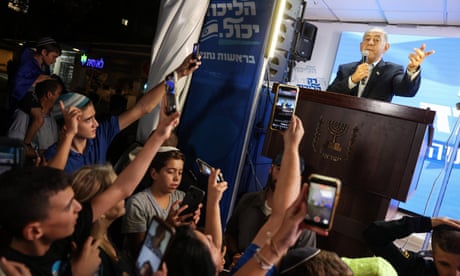
‘Bibi v no Bibi’: Israel’s voters split on comeback of scandal-hit Netanyahu
As with the last four elections since 2019, the contest is expected to be very close; voters are still split on whether the former prime minister Benjamin Netanyahu, beleaguered by corruption cases, is fit to lead the country.
In negotiations aimed at forming stable coalitions in the past, Netanyahu, as head of the conservative Likud, has been willing to join forces with centrist parties and even Islamists. This time around, the longtime leader says he wants a narrow, ideologically cohesive government to stave off a sixth election. Ben-Gvir is the man who can make it happen.
Two years ago, Ben-Gvir’s far-right Jewish Strength was still a fringe political group, but thanks to a deal between small extremist parties orchestrated by Netanyahu before the 2021 election, Ben-Gvir won a Knesset seat.
Since a short-lived coalition government collapsed this summer, he has steadily gained traction, drawing the attention of the Israeli media with fiery speeches and an energetic campaigning schedule.
He is picking up votes that previously went to the now disbanded Yamina alliance, and he appeals to members of the ultra-Orthodox community and Likud voters frustrated with Israel’s political crisis. Intercommunal violence on the streets of Israel last year, and the inclusion of an Arab party in the last government, shocked the rightwing public.
The latest polls predict that Ben-Gvir’s Religious Zionist slate could win 13 or 14 seats, making it the third-largest party in the Knesset. If Netanyahu’s bloc succeeds in winning a majority, it will be the most extremist in history, with the goals of overhauling the Israeli judicial system and further entrenching the occupation of the Palestinian territories.
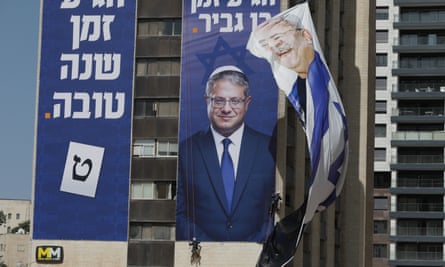
Whenever the far-right politician Meir Kahane got up to speak in the Knesset after winning his Kach party’s only ever seat, in 1984, the rest of the plenum would walk out. Even the hardline prime minister at the time, Yitzhak Shamir, called the rabbi’s anti-Arab movement “negative, dangerous and damaging”. Kach was banned from politics a few years later for inciting racism.
Four decades on, the Israeli-Palestinian conflict is still raging, and Israel’s political sphere is more rightwing than ever before. The country will hold its fifth election in less than four years next week. Kahane’s disciple Itamar Ben-Gvir is on course to become a powerful mainstream force.

‘Bibi v no Bibi’: Israel’s voters split on comeback of scandal-hit Netanyahu
As with the last four elections since 2019, the contest is expected to be very close; voters are still split on whether the former prime minister Benjamin Netanyahu, beleaguered by corruption cases, is fit to lead the country.
In negotiations aimed at forming stable coalitions in the past, Netanyahu, as head of the conservative Likud, has been willing to join forces with centrist parties and even Islamists. This time around, the longtime leader says he wants a narrow, ideologically cohesive government to stave off a sixth election. Ben-Gvir is the man who can make it happen.
Two years ago, Ben-Gvir’s far-right Jewish Strength was still a fringe political group, but thanks to a deal between small extremist parties orchestrated by Netanyahu before the 2021 election, Ben-Gvir won a Knesset seat.
Since a short-lived coalition government collapsed this summer, he has steadily gained traction, drawing the attention of the Israeli media with fiery speeches and an energetic campaigning schedule.
He is picking up votes that previously went to the now disbanded Yamina alliance, and he appeals to members of the ultra-Orthodox community and Likud voters frustrated with Israel’s political crisis. Intercommunal violence on the streets of Israel last year, and the inclusion of an Arab party in the last government, shocked the rightwing public.
The latest polls predict that Ben-Gvir’s Religious Zionist slate could win 13 or 14 seats, making it the third-largest party in the Knesset. If Netanyahu’s bloc succeeds in winning a majority, it will be the most extremist in history, with the goals of overhauling the Israeli judicial system and further entrenching the occupation of the Palestinian territories.

Workers hang an election banner for Itamar Ben-Gvir in Jerusalem.
Photograph: Abir Sultan/EPA
Most Israeli pliticians and voters at campaign events the Guardian has attended over the past two weeks are tired and it shows: the atmosphere has for the most part been weary and lacklustre. A Religious Zionist rally in the working-class town of Sderot, in southern Israel, on Wednesday night was the opposite.
In a packed school gymnasium, the mostly Modern Orthodox crowd – knitted kippahs for men, long skirts for women – skewed young: pop music blasted from a sound system and about 100 young men danced and sang when Ben-Gvir and the party leader, Bezalel Smotrich, entered the hall. Children in the back row shouted “death to terrorists”.
“Every time [Arabs] attack a Jewish car, our people, I run and see what’s happening … We need new rules against terrorists, we need to enable all citizens to protect themselves with guns. We need laws to protect soldiers,” Ben-Gvir said, to cheers from the audience.
“Hamas has threatened me, but I am not afraid,” he added, referring to the Palestinian militant movement. “We are the owners of this land, the owners of this house.”
Young people crowded Ben-Gvir and Smotrich for selfies after the event.
“He’s brave. He says what needs to be said about Arabs, he’s honest,” said 20-year-old Noa, on leave from military service. “I’ve always voted for Netanyahu, but I will vote for Ben-Gvir this time.”
Natan, 21, a yeshiva student, said: “Some of what he says is obviously bullshit. We’re not going to take back Gaza. But if he can do 85% of what he says he wants to do, that’s great.”
Most Israeli pliticians and voters at campaign events the Guardian has attended over the past two weeks are tired and it shows: the atmosphere has for the most part been weary and lacklustre. A Religious Zionist rally in the working-class town of Sderot, in southern Israel, on Wednesday night was the opposite.
In a packed school gymnasium, the mostly Modern Orthodox crowd – knitted kippahs for men, long skirts for women – skewed young: pop music blasted from a sound system and about 100 young men danced and sang when Ben-Gvir and the party leader, Bezalel Smotrich, entered the hall. Children in the back row shouted “death to terrorists”.
“Every time [Arabs] attack a Jewish car, our people, I run and see what’s happening … We need new rules against terrorists, we need to enable all citizens to protect themselves with guns. We need laws to protect soldiers,” Ben-Gvir said, to cheers from the audience.
“Hamas has threatened me, but I am not afraid,” he added, referring to the Palestinian militant movement. “We are the owners of this land, the owners of this house.”
Young people crowded Ben-Gvir and Smotrich for selfies after the event.
“He’s brave. He says what needs to be said about Arabs, he’s honest,” said 20-year-old Noa, on leave from military service. “I’ve always voted for Netanyahu, but I will vote for Ben-Gvir this time.”
Natan, 21, a yeshiva student, said: “Some of what he says is obviously bullshit. We’re not going to take back Gaza. But if he can do 85% of what he says he wants to do, that’s great.”
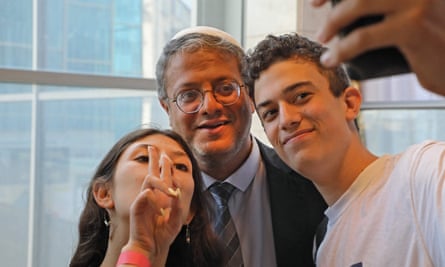
Two young supporters pose for a selfie with Itamar Ben-Gvir in Rishon LeZion, near Tel Aviv. Photograph: Gil Cohen-Magen/AFP/Getty Images
Ben-Gvir’s anti-Arab views were moulded by growing up during the first intifada, or Palestinian uprising. The son of secular Iraqi Jewish immigrants, he joined the Kach youth movement as a teenager, and became famous in 1995 for threatening the prime minister, Yitzhak Rabin, three weeks before he was assassinated. The Israel Defence Forces exempted him from military service owing to his far-right activities.
Now 46, Ben-Gvir has built a legal career defending Jewish extremists, and lives in the restive West Bank city of Hebron, a major target of the settler movement. In 2019, before a failed Knesset run, he reportedly removed a picture of the terrorist Baruch Goldstein from his living room in an effort to appear more moderate.
Since winning his Knesset seat, Ben-Gvir has toned down the rhetoric that got him convicted for incitement, but he still advocates for the deportation of what he calls “disloyal” Palestinian citizens of Israel, who make up 20% of the country. During violent clashes this month in a flashpoint East Jerusalem neighbourhood, he made headlines for drawing a pistol and shouting at police to shoot a group of Palestinian protesters.
According to Dr As’ad Ghanem, a political sciences lecturer at the University of Haifa and co-author of Israel in the Post Oslo Era, Ben-Gvir’s rise is reflective of wide authoritarian political trends around the world. It is also related to the failure of the two-state peace process and a recent intensification of the conflict.
“Until Oslo [the 1990s peace accords], for Israel the main enemy was always outside. Now, because of the Palestinian Authority and the rise of Islamic movements, the threat is seen as internal,” he said.
“For many Jews, it is seen as a life and death issue. They need to open all the fronts: if there’s no option for two states, they must keep the Palestinians under control, and people feel the best way to do that is strong anti-Palestinian politics.”
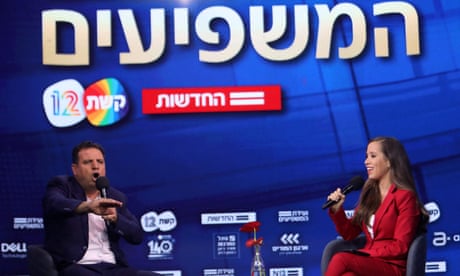
‘One seat could make the difference’: Arab parties rally for votes in Israeli election
At the Sderot rally, most of the older attenders the Guardian spoke to were more circumspect about Ben-Gvir than his younger supporters.
Boaz, 52, who works in the town council, said he would vote for the Religious Zionists for the first time next week, not because of Ben-Gvir’s bombastic personal appeal but because he did not see a better alternative.
“There is nowhere else for Jews to go. This is our country and we need to do everything we can to protect it, which is something I don’t think the left understands. I’m from Ethiopia, I could never go back there,” he said.
“I’m not looking for someone who will make promises about the cost of living or jobs or housing,” he said. “I’m looking for a country with a future.”
Maria Rashed contributed reporting
Ben-Gvir’s anti-Arab views were moulded by growing up during the first intifada, or Palestinian uprising. The son of secular Iraqi Jewish immigrants, he joined the Kach youth movement as a teenager, and became famous in 1995 for threatening the prime minister, Yitzhak Rabin, three weeks before he was assassinated. The Israel Defence Forces exempted him from military service owing to his far-right activities.
Now 46, Ben-Gvir has built a legal career defending Jewish extremists, and lives in the restive West Bank city of Hebron, a major target of the settler movement. In 2019, before a failed Knesset run, he reportedly removed a picture of the terrorist Baruch Goldstein from his living room in an effort to appear more moderate.
Since winning his Knesset seat, Ben-Gvir has toned down the rhetoric that got him convicted for incitement, but he still advocates for the deportation of what he calls “disloyal” Palestinian citizens of Israel, who make up 20% of the country. During violent clashes this month in a flashpoint East Jerusalem neighbourhood, he made headlines for drawing a pistol and shouting at police to shoot a group of Palestinian protesters.
According to Dr As’ad Ghanem, a political sciences lecturer at the University of Haifa and co-author of Israel in the Post Oslo Era, Ben-Gvir’s rise is reflective of wide authoritarian political trends around the world. It is also related to the failure of the two-state peace process and a recent intensification of the conflict.
“Until Oslo [the 1990s peace accords], for Israel the main enemy was always outside. Now, because of the Palestinian Authority and the rise of Islamic movements, the threat is seen as internal,” he said.
“For many Jews, it is seen as a life and death issue. They need to open all the fronts: if there’s no option for two states, they must keep the Palestinians under control, and people feel the best way to do that is strong anti-Palestinian politics.”

‘One seat could make the difference’: Arab parties rally for votes in Israeli election
At the Sderot rally, most of the older attenders the Guardian spoke to were more circumspect about Ben-Gvir than his younger supporters.
Boaz, 52, who works in the town council, said he would vote for the Religious Zionists for the first time next week, not because of Ben-Gvir’s bombastic personal appeal but because he did not see a better alternative.
“There is nowhere else for Jews to go. This is our country and we need to do everything we can to protect it, which is something I don’t think the left understands. I’m from Ethiopia, I could never go back there,” he said.
“I’m not looking for someone who will make promises about the cost of living or jobs or housing,” he said. “I’m looking for a country with a future.”
Maria Rashed contributed reporting
Israel's far-right leader Ben-Gvir wins adoring young fans
Israel's far-right leader Itamar Ben-Gvir may have faced dozens of charges of hate speech against Arabs, but many young voters adore him as the voice of truth.

Far-right leader Itamar Ben-Gvir has been an incendiary figure in Israeli politics for years
Israel's far-right leader Itamar Ben-Gvir may have faced dozens of charges of hate speech against Arabs, but many young voters adore him as the voice of truth.

Far-right leader Itamar Ben-Gvir has been an incendiary figure in Israeli politics for years
© JACK GUEZ

Ben-Gvir is adored by Israeli young people and says it is because 'they know I will protect the country' against 'jihadists'© MENAHEM KAHANA
"The youth follow true messages," argued the Jewish Power party leader ahead of November 1 elections, at a time of flaring violence in the occupied West Bank.
"I don't say one thing and think something else," added the 46-year-old. "I offer my truth and my truth is that we must save the country."
Ben-Gvir, who is often surrounded by throngs of devout boys and young men, said that "young people know that I will defend them when they are in the army.
"They know I will protect the country" against "the jihadists," added Ben-Gvir, an incendiary figure in Israeli politics for years.
As a teenage opponent of the Oslo Peace Accords with the Palestinians, he famously vandalised Yitzhak Rabin's car shortly before the then prime minister was assassinated in 1995.
His political roots lie with the virulently anti-Arab Kach movement that was banned by Israel after one of its supporters, Baruch Goldstein, massacred 29 Palestinians in Hebron.

Rising polls show that Ben-Gvir's grouping may become a crucial parliamentary force

Ben-Gvir is adored by Israeli young people and says it is because 'they know I will protect the country' against 'jihadists'© MENAHEM KAHANA
"The youth follow true messages," argued the Jewish Power party leader ahead of November 1 elections, at a time of flaring violence in the occupied West Bank.
"I don't say one thing and think something else," added the 46-year-old. "I offer my truth and my truth is that we must save the country."
Ben-Gvir, who is often surrounded by throngs of devout boys and young men, said that "young people know that I will defend them when they are in the army.
"They know I will protect the country" against "the jihadists," added Ben-Gvir, an incendiary figure in Israeli politics for years.
As a teenage opponent of the Oslo Peace Accords with the Palestinians, he famously vandalised Yitzhak Rabin's car shortly before the then prime minister was assassinated in 1995.
His political roots lie with the virulently anti-Arab Kach movement that was banned by Israel after one of its supporters, Baruch Goldstein, massacred 29 Palestinians in Hebron.

Rising polls show that Ben-Gvir's grouping may become a crucial parliamentary force
© AHMAD GHARABLI
Now polls suggest the Religious Zionism alliance, which includes Jewish Power, could become the third largest bloc in parliament.
This could make it the main partner in a prospective government formed by opposition leader Benjamin Netanyahu, who is seeking to reclaim the premiership.
Ben-Gvir's particular appeal among young voters stems from him offering "clarity" amid an unprecedented political crisis, said Yossi Klein Halevi of the Shalom Hartman Institute in Jerusalem.
- 'Simply telling the truth' -
Yakir Abelow, 22, who comes from the West Bank settlement of Efrat, argued that Ben-Gvir's message amounted to a "wake-up call".
"It's just refreshing to finally see someone stand up for the values that you believe (in), in terms of building a stronger Jewish state... taking care of what needs to be taken care of," he told AFP.
For Ben-Gvir, that checklist includes annexing the entire West Bank, a territory occupied by Israel since 1967 which is home to 2.9 million Palestinians and 475,000 Jewish settlers.
He has also called for deporting all Arab citizens deemed disloyal to Israel, while criticising the army and police for not using adequate force against Palestinians.
Shlomo Fischer, a sociologist at Jerusalem's Jewish People Policy Institute, said Ben-Gvir's appeal for many is that he does not "compromise".
"He says: people who endanger the state, terrorists, should be expelled and denied all rights," Fischer told AFP.
"He's understood to be authentic. He's not going to compromise because the Americans don't like it."
That message resonates with voters who believe Israel reached a fair peace deal in the 1990s, blaming the Palestinians for the accord's collapse and subsequent bloodshed, Fischer said.
This group believes "that there is no partner, there is no peace process, its unrealistic, (that) we have to live with the conflict and if we live with the conflict then we have to be able to do what we need to do," he explained.
- 'So much pride' -
Channelling Ben-Gvir's purported national security straight-talk, settler Abelow opined that sometimes, "unfortunately, we have to kill people".
"It's so sad. I don't want to send my soldiers to do that, but it's to defend us, knowing that if we don't, more people will get killed."
He told AFP that the moment he put on the Israeli military uniform, he felt "so much pride. I was ready to jump on any terrorist".
With rising polls indicating Ben-Gvir's grouping may become a crucial parliamentary force, he has slightly moderated some of his positions.
He told AFP that while he had called for the expulsion of all Arabs 20 years ago, he no longer supports that position.
Ben-Gvir also took down the portrait of Goldstein, the Hebron mass murderer, when he entered politics.
But for Fischer, the core of Ben-Gvir's appeal remains unchanged.
He has drawn supporters, Fisher said, by arguing that those "who threaten the security of Jews... should be killed, expelled, dealt (with). That will solve the problem."
Now polls suggest the Religious Zionism alliance, which includes Jewish Power, could become the third largest bloc in parliament.
This could make it the main partner in a prospective government formed by opposition leader Benjamin Netanyahu, who is seeking to reclaim the premiership.
Ben-Gvir's particular appeal among young voters stems from him offering "clarity" amid an unprecedented political crisis, said Yossi Klein Halevi of the Shalom Hartman Institute in Jerusalem.
- 'Simply telling the truth' -
Yakir Abelow, 22, who comes from the West Bank settlement of Efrat, argued that Ben-Gvir's message amounted to a "wake-up call".
"It's just refreshing to finally see someone stand up for the values that you believe (in), in terms of building a stronger Jewish state... taking care of what needs to be taken care of," he told AFP.
For Ben-Gvir, that checklist includes annexing the entire West Bank, a territory occupied by Israel since 1967 which is home to 2.9 million Palestinians and 475,000 Jewish settlers.
He has also called for deporting all Arab citizens deemed disloyal to Israel, while criticising the army and police for not using adequate force against Palestinians.
Shlomo Fischer, a sociologist at Jerusalem's Jewish People Policy Institute, said Ben-Gvir's appeal for many is that he does not "compromise".
"He says: people who endanger the state, terrorists, should be expelled and denied all rights," Fischer told AFP.
"He's understood to be authentic. He's not going to compromise because the Americans don't like it."
That message resonates with voters who believe Israel reached a fair peace deal in the 1990s, blaming the Palestinians for the accord's collapse and subsequent bloodshed, Fischer said.
This group believes "that there is no partner, there is no peace process, its unrealistic, (that) we have to live with the conflict and if we live with the conflict then we have to be able to do what we need to do," he explained.
- 'So much pride' -
Channelling Ben-Gvir's purported national security straight-talk, settler Abelow opined that sometimes, "unfortunately, we have to kill people".
"It's so sad. I don't want to send my soldiers to do that, but it's to defend us, knowing that if we don't, more people will get killed."
He told AFP that the moment he put on the Israeli military uniform, he felt "so much pride. I was ready to jump on any terrorist".
With rising polls indicating Ben-Gvir's grouping may become a crucial parliamentary force, he has slightly moderated some of his positions.
He told AFP that while he had called for the expulsion of all Arabs 20 years ago, he no longer supports that position.
Ben-Gvir also took down the portrait of Goldstein, the Hebron mass murderer, when he entered politics.
But for Fischer, the core of Ben-Gvir's appeal remains unchanged.
He has drawn supporters, Fisher said, by arguing that those "who threaten the security of Jews... should be killed, expelled, dealt (with). That will solve the problem."
SEE:
No comments:
Post a Comment